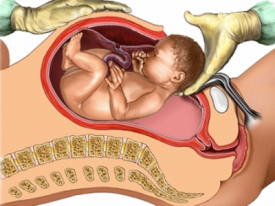- Home
- Editorial
- News
- Practice Guidelines
- Anesthesiology Guidelines
- Cancer Guidelines
- Cardiac Sciences Guidelines
- Critical Care Guidelines
- Dentistry Guidelines
- Dermatology Guidelines
- Diabetes and Endo Guidelines
- Diagnostics Guidelines
- ENT Guidelines
- Featured Practice Guidelines
- Gastroenterology Guidelines
- Geriatrics Guidelines
- Medicine Guidelines
- Nephrology Guidelines
- Neurosciences Guidelines
- Obs and Gynae Guidelines
- Ophthalmology Guidelines
- Orthopaedics Guidelines
- Paediatrics Guidelines
- Psychiatry Guidelines
- Pulmonology Guidelines
- Radiology Guidelines
- Surgery Guidelines
- Urology Guidelines
First successful c-section birth may date back to 1337 find researchers

London : The first birth by caesarean section where both the mother and child survived may have taken place in 1337 in Prague, researchers claim.
Beatrice of Bourbon, the second wife and second cousin of John the Blind, King of Bohemia and Count of Luxembourg, gave birth to her only child, Duke Wenceslaus I on February 25 in 1337.
According to archival documents found by the researchers, Beatrice, a teenage queen consort, had a difficult labour.
"Beatrice most likely passed out during delivery, and was believed dead," said Antonin Parizek of Charles University in Czech Republic.
"The surgeons opened her only to save and baptise the child. The pain from the operation then likely led to her awakening," said Parizek.
At that point, shock may have saved her life by keeping her from bleeding excessively, he said.
Prague in the 14th century was a centre of European learning, and the royal court of Bohemia would have employed the leading doctors of the time, researchers said.
Beatrice recovered from the surgery and lived 46 more years.
In a Flemish rhyming chronicle likely written by a diplomat at court, the author wrote 'the duke was taken from his mother's body and the wound healed,'" Parizek told 'The New York Times'.
Other archival sources described Beatrice "being opened up without dying," Parizek said.
"The event must have been truly uncommon, as information on the medical state of royals was not made public in those times," he added.
Before this study, the earliest documented case was in Switzerland in 1500.
Beatrice of BourbonC-Sectionc-section birthcaesarean sectionCharles UniversityDr Antonin Parizekfirst birth by caesarean sectionFirst successful c-section
Source : PTINext Story
NO DATA FOUND

Disclaimer: This site is primarily intended for healthcare professionals. Any content/information on this website does not replace the advice of medical and/or health professionals and should not be construed as medical/diagnostic advice/endorsement or prescription. Use of this site is subject to our terms of use, privacy policy, advertisement policy. © 2020 Minerva Medical Treatment Pvt Ltd